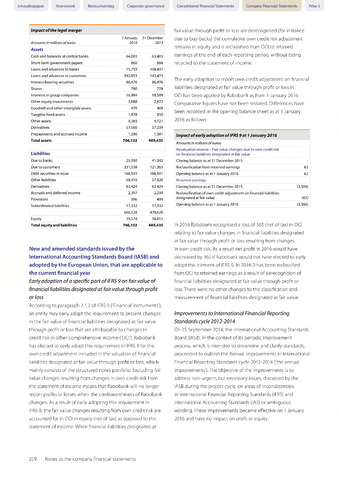-
Inhoudsopgave Voorwoord Bestuursverslag Corporate governance
Impact of the legal merger
Amounts in millions of euros
1 January
2016
31 December
2015
Assets
Cash and balances at central banks
64,001
63,403
Short-term government papers
860
860
Loans and advances to banks
75,759
108,437
Loans and advances to customers
392,853
143,475
Interest-bearing securities
86,476
86,476
Shares
780
778
Interests in group companies
16,984
18,589
Other equity investments
2,688
2,672
Goodwill and other intangible assets
470
469
Tangible fixed assets
1,978
935
Other assets
4,383
4,721
Derivatives
57,580
57,239
Prepayments and accrued income
1,290
1,381
Total assets
706,102
489,435
Liabilities
Due to banks
25,930
41,342
Due to customers
331,538
121,363
Debt securities in issue
166,501
166,501
Other liabilities
58,410
57,920
Derivatives
63,424
63,424
Accruals and deferred income
2,397
2,239
Provisions
996
499
Subordinated liabilities
17,332
17,332
666,528
470,620
Equity
39,574
18,815
Total equity and liabilities
706,102
489,435
New and amended standards issued by the
International Accounting Standards Board (IASB) and
adopted by the European Union, that are applicable to
the current financial year
Early adoption of a specific part oflFRS 9 on fair value of
financial liabilities designated at fair value through profit
or loss
According to paragraph 7.1.2 of IFRS 9 ('Financial Instruments'),
an entity may early adopt the requirement to present changes
in the fair value of financial liabilities designated at fair value
through profit or loss that are attributable to changes in
credit risk in other comprehensive income ('OCI'). Rabobank
has elected to early adopt this requirement in IFRS 9 for the
own credit adjustment included in the valuation of financial
liabilities designated at fair value through profit or loss, which
mainly consists of the structured notes portfolio. Excluding fair
value changes resulting from changes in own credit risk from
the statement of income means that Rabobank will no longer
report profits or losses when the creditworthiness of Rabobank
changes. As a result of early adopting this requirement in
IFRS 9, the fair value changes resulting from own credit risk are
accounted for in OCI in equity (net of tax) as opposed to the
statement of income. When financial liabilities designated at
Consolidated Financial Statements Company Financial Statements Pillar 3
fair value through profit or loss are derecognised (for instance
due to buy-backs) the cumulative own credit risk adjustment
remains in equity and is reclassified from OCI to retained
earnings at the end of each reporting period, without being
recycled to the statement of income.
The early adoption to report own credit adjustment on financial
liabilities designated at fair value through profit or loss in
OCI has been applied by Rabobank as from 1 January 2016.
Comparative figures have not been restated. Differences have
been recorded in the opening balance sheet as at 1 January
2016 as follows:
Impact of early adoption of IFRS 9 at 1 January 2016
Amounts in millions of euros
Revaluation reserve - Fair value changes due to own credit risk
on financial liabilities designated at fair value
Closing balance as at 31 December 2015
Reclassification from retained earnings
62
Opening balance as at 1 January 2016
62
Retained earnings
Closing balance as at 31 December 2015
(3,304)
Reclassification of own credit adjustment on financial liabilities
designated at fair value
(62)
Opening balance as at 1 January 2016
(3,366)
In 2016 Rabobank recognised a loss of 365 (net of tax) in OCI
relating to fair value changes in financial liabilities designated
at fair value through profit or loss resulting from changes
in own credit risk. As a result net profit in 2016 would have
decreased by 365 if Rabobank would not have elected to early
adopt this element of IFRS 9. In 2016 0 has been reclassified
from OCI to retained earnings as a result of derecognition of
financial liabilities designated at fair value through profit or
loss. There were no other changes to the classification and
measurement of financial liabilities designated at fair value.
Improvements to International Financial Reporting
Standards cycle 2012-2014
On 25 September 2014, the International Accounting Standards
Board (IASB), in the context of its periodic improvement
process, which is intended to streamline and clarify standards,
proceeded to publish the Annual improvements in International
Financial Reporting Standards cycle 2012-2014 ('the annual
improvements'). The objective of the improvements is to
address non-urgent, but necessary issues, discussed by the
IASB during the project cycle, on areas of inconsistencies
in International Financial Reporting Standards (IFRS) and
International Accounting Standards (IAS) or ambiguous
wording.These improvements became effective on 1 January
2016 and have no impact on profit or equity.
259 Notes to the company financial statements

